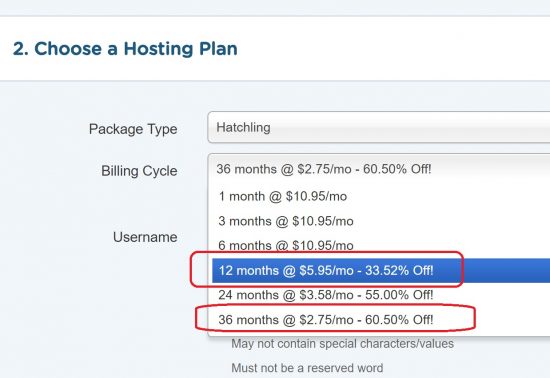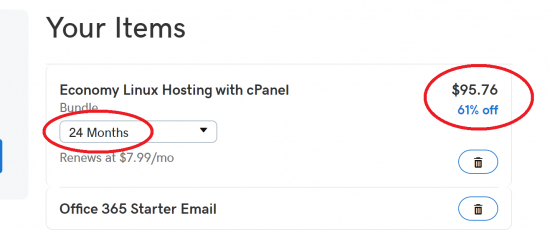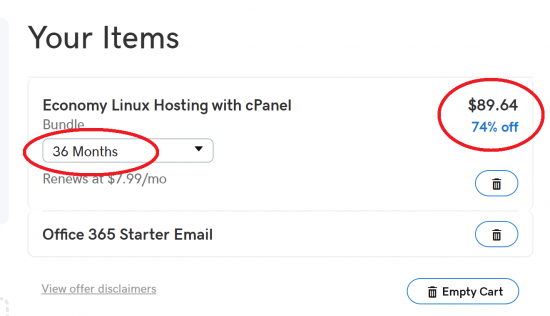Here’s a standardized web hosting comparison chart:
| Basic | Advanced | Premium | |
|---|---|---|---|
| Hostgator Shared Hosting
(See all Hostgator Deals) |
$2.57/m
|
$4.50/m
|
$5.15/m
|
| KnownHost Shared Hosting
KnownHost Coupon Code |
$3.47/m
|
$6.47/m
|
$9.97/m
|
| Bluehost Shared Hosting (See all Bluehost Deals) |
$2.95/m
|
$5.45/m
|
$5.45/m
|
| HostArmada Shared Hosting (See all HostArmada Deals) |
$2.99/m
|
$4.49/m
|
$5.39/m
|
| GreenGeeks Shared Hosting (See all GreenGeeks Deals) |
$2.95/month
|
$4.95/month
|
$8.95/month
|
| SiteGround Shared Hosting (See all SiteGround Deals) |
$2.99/month
|
$4.99/month
|
$7.99/month
|
| Dreamhost Shared Hosting (See all DreamHost Coupons) |
$2.95/month
|
$3.95/month
|
|
| A2 Hosting Shared (See all A2 Hosting Coupons) |
$2.99/month
|
$5.99/month
|
$6.99/month
|
| NameHero Shared Hosting (See all NameHero Coupons) |
$1.34/month
|
$2.59/month
|
$3.99/month
|
| InMotion Shared Hosting (See all InMotion Deals) |
$2.49/month
|
$4.99/month
|
$4.99/month
|
| GoDaddy Shared Hosting (See all GoDaddy Deals) |
$1.00/month
|
$7.99/month
|
$12.99/month
|
| India Plans |
|||
| Hostgator India Shared Hosting (See all Hostgator India Deals) |
₹79/month
|
₹159/month
|
₹199/month
|
The monthly prices here show you the maximum applicable discount. If you choose to host for a shorter time, the “per month” costs will typically rise.
Table of Contents
Web Hosting Comparison Ratings
Here’s how the various web hosting companies compare to each other based on price and features:
| Web Host | Price Rating | Features Rating |
|---|---|---|
| Hostgator | 5/5 ★★★★★ | 2/5 ★★☆☆☆ |
| Bluehost | 3.5/5 ★★★☆☆ | 3/5 ★★★☆☆ |
| HostArmada | 3/5 ★★★☆☆ | 4/5 ★★★★☆ |
| GreenGeeks | 4/5 ★★★★☆ | 4/5 ★★★★☆ |
| SiteGround | 1/5 ★☆☆☆☆ | 5/5 ★★★★★ |
| DreamHost | 4/5 ★★★★☆ | 2/5 ★★☆☆☆ |
| A2 Hosting | 3/5 ★★★☆☆ | 3/5 ★★★☆☆ |
| NameHero | 3.5/5 ★★★☆☆ | 5/5 ★★★★★ |
| GoDaddy | 1/5 ★☆☆☆☆ | 1/5 ★☆☆☆☆ |
As you can see, the price rating ranges from 5 stars to 1, and ditto for the features. GoDaddy is the only web host to score the lowest on both of these with one star in each category.
Here’s a summary of each web host and a link to the full review.
Hostgator Verdict: Low-Cost Hosting with no Frills
Hostgator is the only web host on this list to get 5 stars for price. That’s because they have the largest number of discounts, and the cheapest prices without severely compromising on features. Here’s the complete Hostgator coupon code 2024 table showing each discount with the package.
Hostgator has the lowest web hosting prices, but not many features. At least they have free SSL, unlike GoDaddy.
The lowest shared hosting price starts at $2.57/m. Some web hosts offer higher discounts, so you might get a lower initial price but always check the renewal costs. Don’t get fooled by high initial discounts.
Unfortunately, the low price means you don’t get any additional features like in-built backups or malware scanning. These are available as add-ons to basic hosting, so you can choose to pay extra for them if you want. This way, you get to choose how much of a trade-off you want to keep between price and features.
Hostgator is also the only web host on this list to not use SSD drives. Though they use SSDs for the MySQL databases, the files and folders still run on HD drives. Despite this, Hostgator is still usable. Unlike GoDaddy, they offer free SSL, unlimited storage, and cPanel. I’ve put together a more detailed Hostgator review so you can get a more complete picture of their service.
Bluehost Verdict: Average Features, Average Price
Bluehost doesn’t distinguish itself in anything. It’s average – you can do a lot worse, but there are better options as well. Their pricing isn’t as cheap as Hostgator, since their renewal price for basic hosting starts at $9.99/m. But they have a few perks like SSD drives and better account isolation.
Bluehost is just slightly better than Hostgator – but also more expensive.
But it still doesn’t have automated backups and restores, which is one of the key features that separates serious from amateur hosting. So if you’re looking for something that’s a step above Hostgator, but don’t mind paying a little more, then Bluehost is a reasonable choice. Here are all the Bluehost coupon codes for 2024.
Where Bluehost really shines is its VPS offerings. For similar CPU and RAM configurations, the Bluehost VPS packages have excellent value. But for ordinary shared hosting, it’s nothing special. Like Hostgator, Bluehost has add-on packages for CodeGuard and SiteLock if you want backups and security scanning services. But these should be included as part of any good web hosting package.
I’ve written an in-depth Bluehost vs Hostgator comparison, so you can see what each offers.
GoDaddy Verdict: Terrible Features and Terrible Price
I give GoDaddy 1 star for both price and features. This is for two reasons:
GoDaddy is the worst web host out of all the ones listed here
- They don’t offer free SSL
- Their prices are terrible
GoDaddy has consistently been on my list of terrible web hosts ever since they refused to offer free SSL when the entire industry was moving towards Let’s Encrypt and AutoSSL. Instead, GoDaddy makes you pay $94.99 every year just for basic SSL, which often outstrips the cost of hosting itself! Neither do they offer free backups, or malware scanning – nothing. GoDaddy is one of those rare hosts that charge you high prices in return for zero benefits. Their hosting seems to be stuck in a forgotten period with no value-added services.
Stay away from them at all costs.
SiteGround Verdict: Too Expensive
I freely admit that SiteGround has amazing features and customer service. However, they’re just too expensive. There are other web hosts with similar features like NameHero that are much cheaper.
SiteGround’s features are great, but it’s too expensive.
It wasn’t always this bad. There was a time when SiteGround was expensive – but not unreasonably so. But then SiteGround raised their prices by almost 50% and it was around that time that I stopped recommending them. To coincide with this, they also got rid of cPanel and replaced it with their custom interface, which I felt was aimed at boosting their profit margins instead of doing the right thing for the customer.
SiteGround’s displayed prices sound reasonable. The cost of their StartUp package is $2.99/m. However, it only looks reasonable because of the huge 80% discount. After the discount wears off, you’ll be paying $14.99/m for the StartUp and 24.99/m for the GrowBig plan. This high SiteGround renewal cost will give you sticker shock when you receive your first undiscounted bill.
Despite that, I can’t deny that SiteGround has great features. Their NGINX reverse-proxy setup with caching is really fast, and they have the best backup system in the business, where they store 30-days of your backups offsite that can be restored with just one click. And you can take manual snapshots of your server as well. I myself have used SiteGround for over 7 years, and only recently left for NameHero.
NameHero Verdict: Great Value and Features
NameHero is my recommended alternative to SiteGround, because it has many of the same features, and is much cheaper as well. In addition, they use cPanel and LiteSpeed instead of Apache.
NameHero offers LiteSpeed at a much cheaper price than SiteGround
The LiteSpeed integration sets NameHero above the rest because they offer it on all their plans instead of just the higher-tier packages. That’s why they’re #1 on my list of best LiteSpeed hosting providers. Like SiteGround, they offer automatic backups and restores on all their plans, and store the backups offsite. In addition, they also have free malware scanning – something for which SiteGround makes you pay extra. Here’s a full NameHero vs SiteGround comparison.
NameHero isn’t the cheapest web host though. Their starter package is $1.34/m with a 85% discount. While nowhere near as expensive as SiteGround, they’re not looking to compete on price. For the features they have, my opinion is that their price is exceptional and you won’t find any other host at a similar price. If you’re looking for great value and not necessarily the cheapest web hosting, then I suggest you give NameHero a try. Here’s the NameHero coupon page where you can find the best deals they have going on right now.
DreamHost Verdict: Limited Choice, But Decent Hosting
DreamHost doesn’t have many plans to choose from. Their basic web hosting has just two tiers – starter and unlimited. Their starter plan is really cheap at $2.95/m, which makes them almost cheaper than Hostgator.
DreamHost has just two web hosting packages. It’s cheap, but basic.
But DreamHost is more expensive than Hostgator because their renewal price is $4.95/m. Thanks to a massive initial discount of 40%, it seems cheaper than it really is. As for features, DreamHost doesn’t have anything special. Their shared hosting is as basic as you would expect a low-cost provider to get. No dynamic caching, no reverse proxy. However, to their credit, they have daily backups of your site – something that’s sorely lacking in Hostgator, whose backups suck.
Like Hostgator, DreamHost offers an add-on package for security scanning and malware fixing called DreamShield protection. It’s the equivalent of the Hostgator SiteLock package, which I don’t think is worth it since there are better alternatives. And the same is true of DreamHost. If you’re going to pay extra for malware scanning, then it’s better to use a better host like NameHero that has the scanning built into the package, and also reap the benefits of LiteSpeed.
Why Web Hosting Prices are Misleading
Web hosts show discounts to users only for the first billing cycle. Some, like Hostgator India, show the price for a full 5-years. Look at the following pricing set from Hostgator for example. Here you can see the drastic discounts applied to a 3-year billing cycle.
That’s a difference of 34% and 60%! And guess which one they show on their website? That’s right – the 3-year plan. Hostgator is one of the few web hosts to have separate coupons for different billing cycles. You can see this on the Hostgator coupon code 2024 page.
It’s only when you’re deep in the checkout process do you realize what the actual yearly web hosting prices are. It’s one of the traps that hosting providers use to make you pay more. This being the case, you might be fooled into thinking that you’re getting a discount for 1 year and realize the difference only when you actually pay. So when you compare prices, make sure you’re checking the billing cycle. For example, Hostgator India shows the prices for a 5-years commitment:
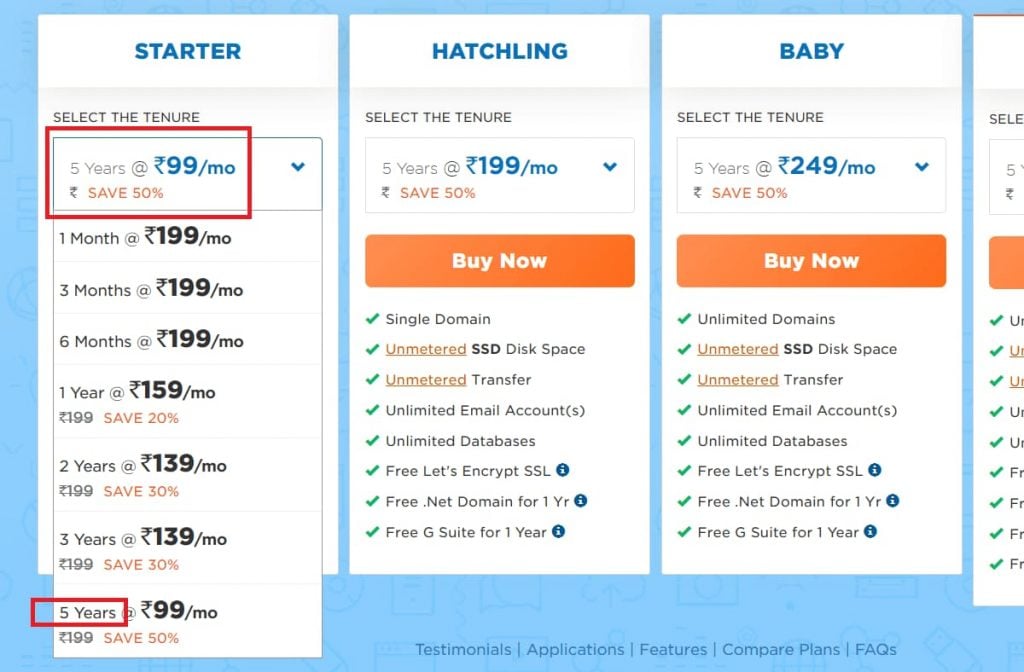
There are two things wrong with this – one, paying up-front for 5 years is a massive investment. Sure, the monthly price might be low, but you have to think of the total cost as well! Second, who even knows if the company will be around in 5 years? Sure, big brands will last, but what about smaller ones?
Web Hosting Renewal Charges are Full Price
In general, the discounts you find on this site only apply for the first billing cycle of hosting. During that time, you get a discounted rate each month. After that, you pay the full renewal price. There’s no way around this, short of migrating your hosting once the initial billing period is up. Some providers like Bluehost give you lower renewal prices for longer billing cycles. But the discounts are nowhere near as steep as those for the first year.
Remember to check for free SSL. Some like GoDaddy make you pay extra!
So if you don’t fancy switching hosting providers all the time, I suggest you look not only at the discounts, but also the full renewal costs to get a better idea of how much you’re going to pay once the discount period is over.
Warning: Make sure you factor in SSL costs. This is an essential part of SSL, but you don’t need to pay for it. Bluehost and Hostgator have announced free SSL with all their shared hosting plans. This leaves only GoDaddy, and they charge really high prices for SSL! So don’t be fooled with $1/month hosting plans when you’re forced to pay big bucks for SSL.
2 Traps That Make You Overpay for Web Hosting
Do you think you’ve gotten a great deal on web hosting? Think again! Because you probably pay too much. Hosting providers know exactly how to extract money and still keep you in the dark! Here’s the typical thought process of a regular person searching for cheap web hosting:
- Compare the prices of various providers
- Look at the provider with the lowest costs for your requirements
- Search for promo or coupon codes
- Determine the length of time for which you pay up front
- Make the purchase
You might even think you’ve been thorough by realizing that web hosting providers give deeper discounts for longer periods. Perhaps you’ve compared the cheapest yearly hosting plans instead of blindly following what providers display on their home pages.
Happy? Don’t be.
Chances are, you just got conned and I’ll show you how hosting providers trick you into paying too much, while still allowing you to think you got a great deal.
Trap 1: Give Ridiculous Discounts…For a VERY Short Time
The time for which you host your website is divided into two parts:
- A discount period
- A “full price” period
(1) is where you get the greatest value. After that, the honeymoon ends and you start paying the full renewal price after the first billing cycle. The ideal is to maximize (1) before starting (2). From the hosting provider’s point of view, they want to start you on (2) as soon as possible. They might even lose money on the first period! That’s because they know that people are reluctant to change their hosting service once they’ve settled in.
Hosting providers can trap you with ultra-low billing cycle discounts.
What better way to make you forego the huge discounts in period (1) than by enticing you to make it as short as possible? Hostgator is the worst offender here. They have a special “PENNY” plan which allows you to host your website for, wait for it…1 cent! That’s right. You can avail of their shared hosting plan almost for free.
But there’s a catch, right? Yes, there’s always a catch.
The problem is that this 1c deal lasts only for a month. “Well, no big deal”, you tell yourself. After all, I’d be paying for the second month anyway, even without the PENNY deal. And this is where you get caught.
After that first month, you will be paying the full price of their hosting plan, which is currently $7.99. You have effectively foregone the entire first period of discounts for the lure of 1c!
A side problem is that Hostgator can secretly enroll you for a higher-tier hosting plan without telling you. Since the price is 1c for the first month of both Hatchling and Baby, you might not notice that you’ve been bumped up!
GoDaddy’s $1 Web Hosting is Another Example
But this is so obvious, that a lot of people don’t fall for it. A more insidious example is GoDaddy’s famous $1 web hosting. Like Hostgator, this too gives you a ridiculous discount of just $1/month. But this time, you can sign up for 12-months, or 1-year. $12 for a year of hosting. Ridiculous! But cheap? Not so much.
Remember that GoDaddy will start billing you the full price of the hosting plan after a year is up. As opposed to their regular shared hosting, which you can pay for up to 10 years in advance!
So the only situation in which $1 web hosting is a good idea, is if you plan to host for exactly one year and then switch hosting providers.
To see this clearly, here is a price comparison chart of the hosting costs for 1, 2, and 3 years from all the hosting providers – including a separate line for GoDaddy’s $1 hosting:
| 1-year | 2-years | 3-years | |
|---|---|---|---|
| GoDaddy Regular Basic Hosting | $71.88 | $95.76 | $161.64 |
| Hostgator Basic Hosting | $30.84 | $82.8 | $135 |
| SiteGround Basic Hosting | $35.88 | $71.76 | $107.64 |
| Bluehost Basic Hosting | $35.4 | $118.8 | $106.2 |
| InMotion Basic Hosting | $29.88 | $71.76 | $89.64 |
| DreamHost Basic Hosting | $35.4 | $94.8 | $93.24 |
| GoDaddy $1 Basic Hosting | $12 | $119.88 | $227.76 |
Here are the takeaways:
- The $1 web hosting plan is cheapest for the first month
- Over 3 years, it’s one of the most expensive!
- It’s cheaper to purchase GoDaddy for 3 years, than it is for two years!
This last assertion is so absurd, that I have to show it with screenshots. Here’s GoDaddy’s hosting cost for 2 years:
And here’s the hosting cost for 3 years:
That’s ridiculous! The additional discount for three years is enough to overcome the cost for an extra 12 months!
But wait…
After seeing this chart, you’re probably thinking “Well, GoDaddy is obviously the cheapest web hosting you can purchase”.
Wrong!
Trap 2: Massive SSL Costs
Hosting providers have found their new cash cow.
A few years ago, this wouldn’t have mattered that much. Most websites were perfectly fine with good old HTTP. Until Google and other companies started pushing for secure SSL connections on every single site. Now everyone’s forced to implement SSL on their servers just to stay safe.
Now some of you know my thoughts on this. In today’s world, I don’t believe anyone should pay for SSL anymore. Free initiatives like Let’s Encrypt make it easy for any business to get basic SSL security. Not the high-end, private, or EV SSLs, but enough to not incur a penalty from Google in the rankings, or the Chrome browser.
But most website owners don’t know about Let’s Encrypt and other ways to get free SSL like Cloudflare’s “Flexible SSL” option. And hosting providers exploit this ignorance. If you’re not careful, you can lose huge money by paying for SSL. And this is the new differentiator when it comes to the Total Cost of Ownership (TCO) of a website.
Here’s the pricing chart for SSL costs from each provider. The ones with “Free”, are those who either support Let’s Encrypt, or those who provide their separate free SSL like InMotion hosting.
| SSL 1-year | SSL 2-years | SSL 3-years | |
|---|---|---|---|
| GoDaddy SSL | $767.88 | $1907.76 | $3047.64 |
| Hostgator SSL | Free | Free | Free |
| Bluehost SSL | Free | Free | Free |
| InMotion SSL | Free | Free | Free |
| SiteGround SSL | Free | Free | Free |
| DreamHost SSL | Free | Free | Free |
Note how expensive GoDaddy SSL is! Which flies in the face of GoDaddy being the most economical hosting service. Cheap hosting? Yes. Cheap SSL, hell no!
Why Can’t I Purchase my SSLs from Elsewhere?
You absolutely can! If you want to go the extra mile, you can purchase web hosting from provider A, get your SSL certificate from provider B, and then import the SSL into your web hosting. You can even generate free SSLs from Let’s Encrypt to use with your hosting.
What’s the problem with that?
Here are two issues that I feel make this an undesirable choice:
I’m a big believer in the KISS principle – Keep it Simple Stupid! Yes, you can purchase an SSL and use it elsewhere, but it requires fiddly stuff like downloading and certificate files, etc. The more complex a procedure is, the higher the chances of something going wrong. Point and click is honestly the best way to do these things.
Keep your SSL setup simple. If something goes wrong, it should be easy to fix.
The free Let’s Encrypt certificates are only valid for 90 days each. If you generate and import them manually, you’ll have to remember to renew them every 3 months. Needless to say, this is a recipe for disaster. It’s very dangerous to have your SSL run out like, and I feel the risk isn’t worth it. The safest way to use Let’s Encrypt is when it’s offered directly by your hosting provider. They will renew it for you automatically 1 month before it runs out, and you’re never in danger of losing SSL protection.
If you use Cloudflare, there’s even a simpler option. Let’s Encrypt has problems working with those using a Cloudflare DNS because it’s unable to check whether a certain IP is associated with your site. You can fix this problem by generating a 15-year SSL directly from Cloudflare.
In short – don’t purchase SSL elsewhere. Keep it simple!
Hosting + SSL Costs – Never Overpay for Web Hosting Again
Now let’s put the two together. GoDaddy is the cheapest option for “pure” hosting. On the other hand, they have the most expensive SSL options. Adding these two, we get the following price chart:
| 1-year | 2-years | 3-years | |
|---|---|---|---|
| Hostgator Basic Hosting | $30.84 | $82.8 | $135 |
| SiteGround Basic Hosting | $35.88 | $71.76 | $107.64 |
| Bluehost Basic Hosting | $35.4 | $118.8 | $106.2 |
| InMotion Basic Hosting | $29.88 | $71.76 | $89.64 |
| DreamHost Basic Hosting | $35.4 | $94.8 | $93.24 |
| GoDaddy Regular Basic Hosting | $779.88 | $2003.52 | $3209.28 |
| GoDaddy $1 Basic Hosting | $779.88 | $2027.64 | $3275.4 |
Takeaways:
- GoDaddy is the most expensive hosting provider in total costs
- The $1 web hosting is a terrible Even for annual hosting!
- Providers with free SSL are the most economical web hosts
Knowing these two tricks in advance will help you avoid the traps that make you pay too much for web hosting. Remember – these days “web hosting” isn’t enough. You need SSL to have a functional site. And when you consider that, everything changes! Hosting providers that were previously too expensive compared to the others suddenly become the most economical.
Types of Web Hosting Discount
Searching for the best web hosting deal can be confusing because each host has a slightly different spin on the way they offer discounts. If you’re not careful, you can find yourself hit with a surprise bill at the end of the year. This is one of the reasons why hosting prices are misleading. So here’s a quick 5-minute guide to the different types of web hosting discounts.
1. Coupons for the First Billing Cycle
Coupons are the first thing you think of when you want “deals”. And coupon usage is a time-tested way of offering discounts on web hosting. These are typically applied for a limited billing period, and then you pay full price for the service on subsequent bills.
An excellent example of web hosting coupons is Hostgator. Their list of coupons is legendary and covers all hosting scenarios and products. You can get a separate coupon for 1, 2, or 3 years. Plus they also offer a free domain name.
Discount Billing Cycles Vary
“Dummy” coupons look like real coupons, but are applied automatically with no option to change them.
Remember to check exactly how long the discount period lasts, as this isn’t always explained clearly. For example, Liquid Web’s coupons never last for longer than a few months. Some others last for years. Obviously, the longer period for which you can apply a coupon, the greater total savings over the lifetime of your web hosting.
“Dummy” Coupons
Some web hosts want to give the appearance of having coupons, without actually needing to provide one. These coupons are applied automatically on checkout and don’t require any intervention from your end. An example of this is A2 Hosting.
2. Flat Discounts for a Limited Period
The second type of hosting deal is a flat discount without the need for any coupon. This discount applies for only a limited time, exactly like the coupons mentioned above.
The best example of this is SiteGround, which offers huge discounts for the first year, and then ratchets up the prices considerably. Many customers have been hit with bill shock after receiving their first “full” bill. Bluehost is another provider that has flat discounts without any coupon code.
Functionally, these discounts behave in the same way as coupons, but with considerably less flexibility. You either take what they give you, or you take nothing at all.
3. Recurring Discounts – The Hidden Gem
One form of savings that isn’t well-publicized, is the recurring savings for longer billing cycles. The idea is simple – regardless of the initial coupon or discount, many web hosts will reduce the value of subsequent bills if you sign up for longer periods.
For example, Hostgator has regular coupons for the first billing cycle – we all know this. However, did you know that they also reduce their “per month” prices when you sign up for longer? Here’s a screenshot demonstrating the price difference:
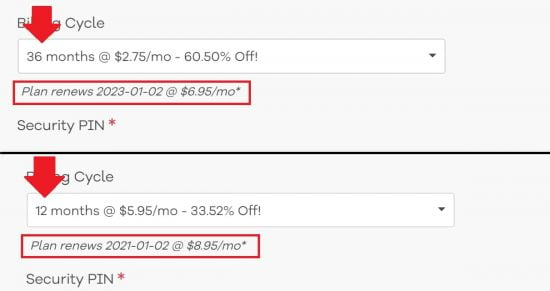
You can see here, that if you sign up for one year, the regular “per month” price is $8.95/m after the first billing cycle. However, when you sign up for 3 years, the price drops to just $6.95/m. That’s around 23% extra savings. Per year! And those savings add up each time you renew.
Combined with regular coupons, these extra savings become massive the longer you stay with a given host. NameHero also has recurring savings, which makes it a very attractive option since they also have the 2nd type of discount on sign-up. Another example is the WordPress specialist hosting company Kinsta.
Others like Bluehost don’t give any indication of these recurring savings. So if you’re looking for a web hosting company for the long term, consider one that has lower prices for each billing cycle.
Bottom Line
Hopefully, this article has helped you understand the different ways in which hosting companies provide coupons and discounts. All of them fall into one of these three categories. So here’s hoping you find what you’re looking for. Good luck!

